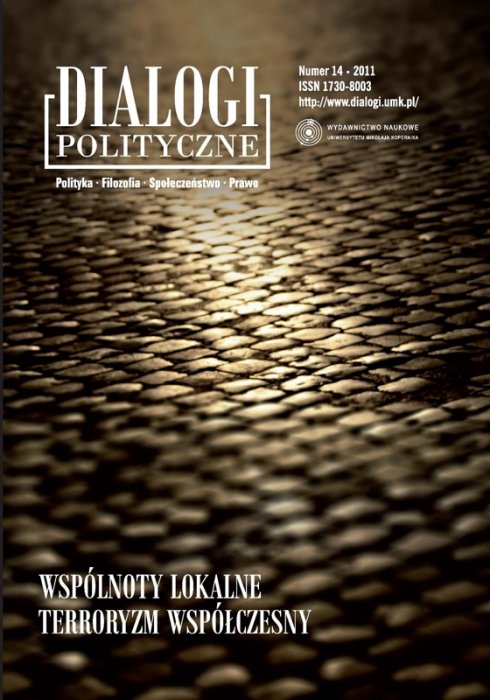Europejska walka z islamskim terroryzmem
DOI:
https://doi.org/10.12775/DP.2011.007Abstract
The world and also the United States of America are not any safer by undertaking countermeasures after the 9/11 attacks. Finding the adequate modus vivendi in the new situation is the priority of the European Union. What is the purpose and what is the consequence of the aggressive attitude of Islamic radicals toward the Western World? Does this aggression derive from the ideology of hatred against the Western World and its values or is it rather a result of previous actions of the USA and its allies before and after the attacks on America? What has been done in the military and social-economy level to improve the security of the European states in terms of terrorist attacks? And finally what actions should be undertaken to increase the safety level of the Europeans and to decline the risk of terrorist attacks? First section of this article is devoted to the reason for terrorist attacks beginning from early 1990’s until the tragic final in September 2001. It concentrates on reasons for the frustration of the Islamic radicals driving to acts of terror against military staff, institutions and civilians. Afterwards appears the American response – Bush’s doctrine with its fundamental pillars: unilateralism, fight against states supporting terrorism, right to the pre-emptive strike and the introduction of democracy there, where the aggressive regimes are present. The Europe follows the American path and must handle its effects. Consequently the Europeans marginalized the role of the North Atlantic Treaty Organization and the United Nations Organization by participating in wars in Iraq and in Afghanistan under the auspices of Washington. The last chapter about the social and economic dimension of the European fight against terrorism describes stereotypes between Europeans and Muslims which show no tendency to decline. On the opposite the tendency shows the increasing feeling of mistrust. Concerning economy the lack of strong business bonds is the reason for the lack of further cooperation and might indirectly lead to the aggressive attitude and the rise of radical ideologies. Poverty and the lack of perspectives is the basis for fundamentalism.References
S. Hedges, Military to leave Audi Arabia. U.S. amid strained relations, Chicago Tribune, 30.04.2003 [dostęp: 03.04.2010; http://www.globalsecurity.org/org/news/2003/030430-psab01.htm].
Al-Somood Magazine, „The Media Activities of the Taliban Islamic Movement”, 17.01.2008. Zob. także: Carsten Bockstette, Taliban and Jihadist Terrorist Use of Strategic Communications, [w:] Connections. The Quarterly Journal, nr 3, 2009.
S. Tatham, Losing Arab Hearts and Minds. The Coalition Al-Jazeera and Muslim Public Opinion, Londyn 2006.
T. Donnelly, Ponownie przemyśleć NATO, [w:] NATO Review Summer 2003, [dostęp: 03.04.2010; http://www.nato.int/docu/review/2003/issue2/polish/art2.html].
J. King, David Ensor, Powell: Iraq hiding weapons, aiding terrorists, CNN, 06.02.2003, [dostęp: 03.04.2010; http://www.cnn.com/2003/US/02/05/sprj.irq.powell.un/index. html].
J. Symonides, Debates and controversies. International Legal Aspects of the Struggle against Terrorism, [w:] Żurawia Papers, Warszawa 2008.
A. Zick, Beate Küpper, Hinna Wolf, European Conditions. Findings of a study on Groupfocused Enmity in Europe, Berlin 2009.
D. Pszczółkowska, Dlaczego młodzi z przedmieść palili samochody, „Gazeta Wyborcza”, 11.11.2005, [dostęp: 03.04.2010; http://wyborcza.pl/1,75515,3010936.html].
International Religious Freedom Report 2009.
Vivienne Walt, Sending Europe’s Asylum Seekers Home, Time, 23.10.2009, [dostęp: 03.04.2010; http://www.time.com/time/world/article/0,8599,1931717,00.html].
L. Fekete, A Suitable Enemy. Racism, Migration and Islamophobia in Europe, New york 2009.
A. Elshobaki, G. M. Muńoz, Papers for Barcelona 2010: Why Europe must engage with political Islam, 2010.
B. von Zahn, Ökonomie produziert Moral, Der Spiegel, 01.02.2010.
A. Liepinyte, Emigration von Arbeitskräften nach dem EU-Beitritt: Wer gewinnt und wer verliert? Eine Analyse am Fallbeispiel Lettlands, [w:] Baslerschriften zur europäischen Integration, 2009.
R. Coolsaet, T. S. de Swielande, Belgium and counterterrorism policy in the jihadi era (1986–2007), Bruksela 2007.
J. Ward, E. Lake, White House: ‘War on Terrorism’ is over, “The Washington Times”, 06.09.2009, [dostęp: 03.04.2010; http://www.washingtontimes.com/news/2009/ aug/06/white-house-war-terrorism-over/].
R. Aliboni, A. Saaf, Human Security: a New perspective for Euro-Mediterranean cooperation, [w:] 10 Papers for Barcelona 2010.
M. Aseburg, P. Salem, No Euro-Mediterranean Community without peace, [w:] 10 Papers for Barcelona 2010.
Downloads
Published
How to Cite
Issue
Section
Stats
Number of views and downloads: 1537
Number of citations: 0



